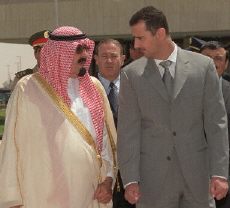A Year after Hafez al-Assad's Death, Son Keeps Syria on Same Path

Syrian President Bashar al-Assad (R) escorts Saudi Crown Prince Abdullah bin Abdel Aziz upon his arrival at Damascus airport 06 June 2001. Abdullah arrived in the Syrian capital at the start of a multi-nation tour, saying that Israel had 'crossed the limits' in its crackdown on the Palestinians and accusing the United States and Europe of bias towards the Jewish state. |
DAMASCUS, June 7 (AFP) - One year after the death of Hafez al-Assad, who ruled Syria with an iron fist for 30 years, about the only change in Damascus is that his portraits have been taken down.
They have been replaced by those of his son Bashar, the Arab world's youngest head of state, who is steering Syria on a course almost identical to that set by his father.
On Syria's principal political issue, the more than 50-year-old conflict with Israel, Bashar has closely followed the line of his father, repeating a demand for a "just and comprehensive peace" and an Israeli withdrawal from all land it captured in the 1967 Six-Day War.
"It's as if Hafez al-Assad was running Syria from his grave," a Syrian journalist said.
The state press still trumpets Hafez al-Assad as the "eternal leader," despite his death on June 10, 2000 after a long bout with diabetes and heart disease.
Those who had predicted a less rigid style from Bashar, a 35-year-old eye doctor who studied in Britain, have been proved wrong.
In his first state visit to the West, a May trip to Spain, Assad declared that Israel was "more racist than the Nazis".
And, in comments denounced in Israel and the West as anti-Semitic, Assad used a visit by Pope John Paul II last month to accuse Israelis of "trying to kill religions in the same way (the Jews) betrayed Jesus Christ, in the same way they tried to kill the Prophet Mohammed".
The one area in which Syria has changed noticeably has been fiscal policy, with Assad accelerating the reforms launched by his father to jumpstart an economy that has been stagnant for close to 20 years.
Under Bashar the country has passed more than 100 laws to liberalize the economy and attract investors. The most radical measures include the creation of a Syrian stock exchange and the first private banks.
But despite the economic modernization, Assad has made clear he will not stand for any doubts on the power of Baath, the pan-Arab socialist party which has run Syria since 1963.
Assad moved to end what independent Syrian MP Riad Seif had called the "Damascus Spring" -- the growing calls by intellectuals and businesspeople for political reform, including free elections and an end to the state of emergency in force since the Baath party took power.
The reform movement had come into the open in September, two months after Assad took power, with calls for change coming mostly from political discussion groups that had sprung up at private homes. The government all but banned the political "salons" in February.
A few weeks later, Assad made clear that he would not tolerate any criticism of his father, the Baath party or the army, in what he described as his "red lines".
Political reform must wait for the economic changes, said Vice President Abdel Halim Khaddam, who has remained influential under both Assads and dismissed predictions that Syria's old guard would be replaced.
After taking power in July, Assad ordered that the omnipresent portraits of his late father be taken down. But the sayings of Hafez al-Assad still come in daily doses in the press and on banners around the cities.
In government offices, pictures of the two Assads are displayed side by side, a symbol of Bashar's desire for continuity.

















